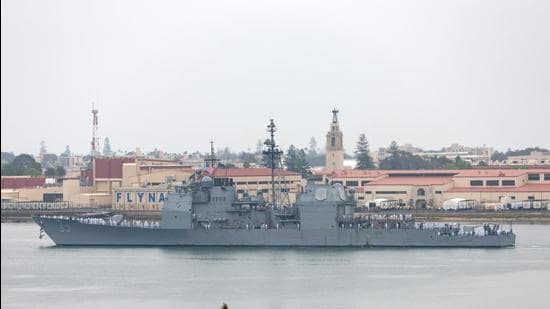In the seas, when the US and India differ on principle
In the current instance of April 7, the US is sticking by its interpretation of the exclusive economic zone and India is pointing to its domestic laws that mandate Delhi’s prior concurrence. Harmonising these divergent positions will be complex and contested but is necessary
Last week, the United States (US) Navy’s Seventh Fleet put out a routine announcement on its website: “On April 7, 2021 USS John Paul Jones (DDG 53) asserted navigational rights and freedoms approximately 130 nautical miles west of the Lakshadweep Islands, inside India’s exclusive economic zone, without requesting India’s prior consent, consistent with international law.”

This announcement may have been one of several freedom of navigation (FON) announcements for the US Navy (USN) but led to a considerable degree of dismay and outrage in India, more so given the recent Quad summit.
The external affairs ministry issued a statement asserting that India’s position “on the UN Convention on the Law of the Sea (UNCLOS) is that the Convention does not authorise other states to carry out in the Exclusive Economic Zone (EEZ) and on the continental shelf, military exercises or manoeuvres, in particular those involving the use of weapons or explosives, without the consent of the coastal state.” It further added that Delhi had “conveyed our concerns regarding this passage through our EEZ to the government of the USA through diplomatic channel”. However, the Pentagon defended its Navy, asserting that the actions of its warship were “consistent with international law”.
Also Read | India, US to work closely on clean energy: US envoy John Kerry
What explains this US unilateralism and is the Pentagon targeting India alone? A review of navigational rights announcements by the USN since last November indicate that it has conducted such patrols, citing “excessive maritime claims” by many nations including Russia, Japan, China, Vietnam, the Philippines, South Korea, Sri Lanka, India and the Maldives.
Traditionally, the oceans of the world have been designated as the global commons and FON is enshrined in customary practice and codified by international law. Any ship that is flying the flag of a sovereign State, and engaged in legitimate maritime activity is not to be hindered on the high seas; this is also the bedrock of global trade. Thus, when there is reference to FON and respecting international law, it usually pertains to the non-military domain.
The more nettlesome activity is freedom of navigation operations (FONOP), which are carried out by naval platforms and have come into focus after the 1982 United Nations Convention on the Law of the Seas (UNCLOS), which introduced the concept of territorial waters (12 nautical miles from the coast), a contiguous zone (24 nautical miles) and an EEZ that extends to 200 nautical miles.
Coastal states can exercise sovereign rights in their territorial waters while allowing for “innocent passage” of naval platforms; they have some policing and pollution/health related enforcement rights in the contiguous zone. The UNCLOS envisaged the EEZ as a region whose natural resources could be exploited but did not confer exclusive sovereignty rights.
The rationale for such a classification is that if all EEZ claims of the global community were aggregated, it would amount to almost 38% of the global commons. UNCLOS concluded that restricting access and passage in more than a third of the global maritime domain was untenable.
Also Watch | French ships Tonnerre & Surcouf reach Kochi ahead of drill with QUAD navies
UNCLOS was adopted in 1982 but many anomalies came to the fore. The US accepted its provisions but chose not to be a signatory. Countries such as India and China signed up but added their own caveats and interpretation. And hence there was a lack of a consensual interpretation of the EEZ and the rights it confers on the coastal State.
In the current instance, the US is sticking by its interpretation of the EEZ and India is pointing to its domestic laws that mandate Delhi’s prior concurrence. Harmonising these divergent positions will be complex and contested but is necessary.
It may be prudent for the Quad nations that have emphatically upheld the FON principle and adherence to international law in the Indo-Pacific to decide on “whose” version of the law is to be upheld. Apropos adherence to law, for instance, there are different standards all around — for instance, the US and United Kingdom are yet to accept the UN tribunal ruling in relation to Diego Garcia.
While maritime law cannot be divorced from geopolitics and State power, neither can it be devoid of acknowledging the sanctity of principle.
C Uday Bhaskar is the director of Society for Policy Studies
The views expressed are personal
Get Current Updates on India News, Lok Sabha Election 2024 live, Infosys Q4 Results Live, Elections 2024, Election 2024 Date along with Latest News and Top Headlines from India and around the world.



